By Casey Neill
Maternity leave gave Lauren Munday the career pause she needed to pivot and find her passion.
The Mordialloc mum of two, teacher, and author helps students to adjust their mindset through her program Think Set Go.
“It’s about understanding how we think and the way that we hold ourselves back sometimes because of our past stories,” she said.
“When we have a goal we need to see it as a fresh thing that we can achieve.”
Lauren aims to help students cope under pressure, presenting them with tools in a fun way.
Both of Lauren’s parents were teachers and she loved sport, so she was drawn to PE teaching – the first piece of the Think Set Go puzzle.
The second was discovering the power of her mind while playing AFL. She took up the game at age 28.
Lauren listened to podcasts, read books, and sought out information to help her get her head in the game and keep it there.
“I was shocked at how the mindset stuff just skyrocketed me,” she said.
Within two years she was playing in the VFLW and became the Carlton side’s vice-captain.
“Then I got injured and reassessed it all,” she said.
“When I was in a good headspace I was excelling. When I was in a negative headspace that’s all I could focus on – all the negatives.
“When I stepped away I thought ‘I don’t want that to happen to anyone else’.”
The Think Set Go picture was coming together. Then Lauren fell pregnant.
“I found maternity leave to be the thing I needed,” she said.
“It’s a forced break from work. Sometimes that’s what you need to reassess.
“I didn’t know how else my days could go.
“I was just so used to going in and teaching in a school.
“If I only focused on going back to work, I would have just gone back to work.”
Instead, Lauren wondered what else she could do.
“It was conscious. I chose,” she said.
“There was this gap in my life.
“This was a crossroads – where do I want to be in 10 to 15 years?”
People ask her how she juggled a career change and motherhood.
“You prioritise when you want to do something,” she said.
“I always made sure I had a list of things I wanted to get done for the Think Set Go, so when I did get a break when I had the baby, it was just there.
“We underestimate what we’re capable of.
“I’m getting the groundwork done while I can’t go all out.
“People think it’s all or nothing. Ease into it.
“Motherhood’s made me do what needs to be done and not dwell on things that aren’t important because there’s no time for that.”
Lauren practices what she preaches. When she feels overwhelmed or stuck or lacks motivation, she asks ‘do I need to think, set or go?’.
Think refers to asking questions like ‘Do I need to regain focus or shift my perspective? What do I want to achieve? What’s holding me back? How can I adapt my mind to support me?’
“I remind myself of what my values and priorities are. I remember what the aim is,” Lauren said.
For set, Lauren asks: ‘Do I need to set myself up better? Do I need to plan or prepare in a different way so that I can stick to this plan and commit? Do I need to adapt a routine or change something to make it easier for me to persist?’
Then it’s go time: ‘Do I need to figure out how to simply do what needs to be done in the moment? How can I take action when I don’t want to? How can I adapt the way I am thinking right now to commit to the plan?’
“I can practise all this stuff when I do my CRT,” she said.
“I go to different schools on purpose.
“It’s like market research.
“I’m becoming better at dealing with different situations and different kids.”
Lauren wrote up workshops in a succinct one-page format, not knowing how valuable his exercise would be.
She had trouble getting hold of a book so reached out to the publisher for a copy.
Soon she was chatting about writing a mindset book. Her workshop summaries formed a makeshift manuscript.
Mindset Handbook: Mastering Your Mind for Success was published in May.
It’s aimed at secondary school students, “but an adult could pick it up as well and learn a lot”.
“What I’m seeing in schools is the way parents are has rubbed off on their kids,” she said.
“If parents can learn to change their mindset, that will filter down.
“Awareness is the first step: we’re thinking that way and we don’t have to.
“We don’t really feel like we’re in control of it.
“We don’t even think ‘Am I thinking in a way that’s helping me here?’.
“We find it easier to go through with ‘This is how I feel so this is how the day will be’.
“You can change that at any time.
“When we have a thought for the first time, neurons talk in our brains.
“The more we think it, the stronger the pathway becomes.
“Then it becomes a priority thought.
“If it’s a negative one we think about often, it’ll be prioritised.
“The only way to change that is to consciously put the positive one in its place.
“Shift the way you naturally think.”









